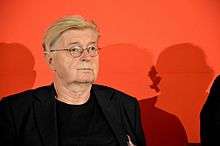Thomas Meyer (political scientist)

Thomas Meyer is a German political scientist.
Life
Thomas Meyer studied philosophy, political science, and German literature at the University of Frankfurt. In 1973, he received a doctoral degree at Frankfurt for a dissertation about the role of the proletarian in Karl Marx's theory of liberation. He received the Habilitation from the Free University of Berlin in 1977. In later years, Meyer has studied the role of the media in modern politics and has become a noted critic of the way the media influences the style and content of political debates. He is a member of the Social Democratic Party of Germany and is the vice-chairman of the party's committee on fundamental principles. He has also written several books on the history and theory of social democracy.[1][2]
Neue Gesellschaft/Frankfurter Hefte (NGFH)
Meyer is editor of the journal Neue Gesellschaft/Frankfurter Hefte (NGFH) (New Society/Frankfurt Issues).[3]
EU work
Meyer was a member of the European Commission's Social Sciences and Humanities Advisory Group and is an individual expert in the EU-NESCA Project.[4]
Recent publications
- The Theory of Social Democracy (with Lewis Hinchman) - Cambridge 2007 - ISBN 0-7456-4113-X[5]
- Was ist Politik? - Wiesbaden, 2006 - ISBN 3-8100-3545-9
- Theorie der sozialen Demokratie (with Lew Hinchman and Nicole Breyer) - Wiesbaden, 2005 - ISBN 3-531-14612-2
- Die Identität Europas. Der EU eine Seele? - Frankfurt am Main, 2004 - ISBN 3-518-12355-6
- Identitätspolitik. Vom Missbrauch kultureller Unterschiede - Frankfurt am Main, 2002 - ISBN 3-518-12272-X
- Mediokratie: die Kolonisierung der Politik durch die Medien - Frankfurt am Main, 2001 - ISBN 3-518-12204-5
- Die Inszenierung des Politischen: zur Theatralität von Mediendiskursen (with Rüdiger Ontrup and Christian Schicha) - Opladen, 2000 - ISBN 3-531-13433-7
- Politik als Theater : die neue Macht der Darstellungskunst (with Martina Kampmann) - Berlin, 1998 - ISBN 3-351-02477-0
References
- Institute of European Studies, Macao - biography of Thomas Meyer (Accessed Dec. 2010) Archived 2010-12-07 at the Wayback Machine
- Friedrich-Ebert-Stiftung - biography of Thomas Meyer
- Neue Gesellschaft/Frankfurter Hefte (NGFH)
- GARNET Centre of excellence
- Sandbrook, R (2008) Review of Thomas Meyer, with Lewis Hinchman, The Theory of Social Democracy, Perspectives on Politics, 6, no. 4, 848